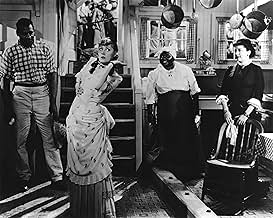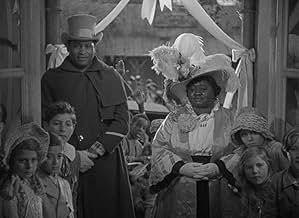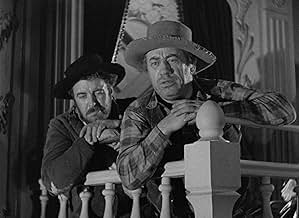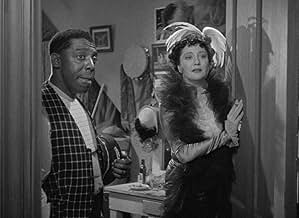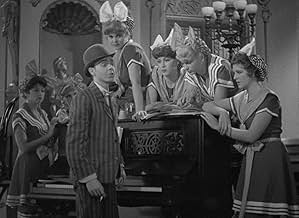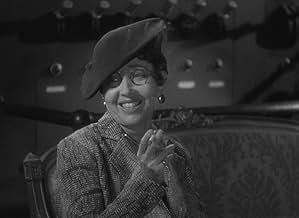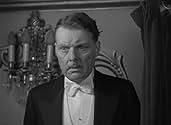IMDb-BEWERTUNG
7,4/10
3910
IHRE BEWERTUNG
Füge eine Handlung in deiner Sprache hinzuDespite her mother's objections, the naive young daughter of a show boat captain is thrust into the limelight as the company's new leading lady.Despite her mother's objections, the naive young daughter of a show boat captain is thrust into the limelight as the company's new leading lady.Despite her mother's objections, the naive young daughter of a show boat captain is thrust into the limelight as the company's new leading lady.
- Auszeichnungen
- 3 Gewinne & 1 Nominierung insgesamt
Maude Allen
- Fat Woman
- (Nicht genannt)
Empfohlene Bewertungen
When we talk about adaptions of Show Boat for the screen, we talk first about this one and then the others. If for no other reason than it gives us a chance to see three of the original performers from the original Broadway cast, Charles Winninger, Helen Morgan, and Francis X. Mahoney. Their performances on stage and on the screen became career roles for each.
Also Allan Jones and Irene Dunne are as perfect a Gaylord Ravenal and Magnolia Hawkes as you'll ever find. Irene was THE Jerome Kern girl on the silver screen, she was lucky to be in three musical adaptions of his shows, this one and Roberta and Sweet Adeline. His songs and her voice seem to be made for each other.
Ravenal's part is one of the most difficult to do in musicals. In the 1951 Show Boat Howard Keel sang wonderfully, but he projects too strong an image for the part. Gaylord Ravenal is a charming, but a very weak character. Allan Jones was the one who really got it right and it's on Ravenal's performance that the whole plot of the show turns on. He really rings true in Hattie McDaniel's assessment of him as the kind of gentlemen it's a pleasure to wait on.
James Whale as director really captures the spirit of 20 years on each side of the turn of the last century with warts and all. Show Boat as a play was bold in its day in tackling racism and miscegenation. Even when this was produced first in 1927 there were still miscegenation laws on the books. He gave Helen Morgan the career role she was most identified with.
Helen Morgan personified the phrase torch singer. From 1927 until this film she had descended into alcoholism and five years from this film she would have passed away from the effects of same. She had a career in Hollywood as well as Broadway and this was her final effort. How fortunate we are to have a filmed record of her performance and her singing of Can't Help Lovin' That Man and Bill.
Ravenal and Magnolia are given three great ballads to sing, classics all, Make Believe and You Are Love and Why Do I Love You. The first two are sung by Jones and Dunne and the third was eliminated from the film although it is heard on the soundtrack. Jerome Kern and Oscar Hammerstein wrote another song I Have the Room Above which is also a most charming duet.
Of course no discussion of Show Boat is complete without Paul Robeson and Ol' Man River. Believe it or not Robeson wasn't in the original Broadway cast. The Broadway opening was delayed and Robeson had some other contractual commitments in 1927. Another black baritone concert singer named Jules Bledsoe introduced Ol' Man River, arguably the greatest song Jerome Kern ever wrote. It became a signature song for Paul Robeson in both stage performances of Show Boat and in this film. His presence in singing Ol' Man River is another reason for this being the greatest Show Boat of all.
Robeson also has a duet with Hattie McDaniel in I Still Suits Me another song Kern and Hammerstein wrote for this film. It's a nice comedy duet. In fact I would say that Show Boat and Annie Get Your Gun are the two shows with the most hit songs in them ever written.
Show Boat is a grand American classic. Somewhere as I write this review there is a company performing right now on this planet. It will be so for generations to come.
Also Allan Jones and Irene Dunne are as perfect a Gaylord Ravenal and Magnolia Hawkes as you'll ever find. Irene was THE Jerome Kern girl on the silver screen, she was lucky to be in three musical adaptions of his shows, this one and Roberta and Sweet Adeline. His songs and her voice seem to be made for each other.
Ravenal's part is one of the most difficult to do in musicals. In the 1951 Show Boat Howard Keel sang wonderfully, but he projects too strong an image for the part. Gaylord Ravenal is a charming, but a very weak character. Allan Jones was the one who really got it right and it's on Ravenal's performance that the whole plot of the show turns on. He really rings true in Hattie McDaniel's assessment of him as the kind of gentlemen it's a pleasure to wait on.
James Whale as director really captures the spirit of 20 years on each side of the turn of the last century with warts and all. Show Boat as a play was bold in its day in tackling racism and miscegenation. Even when this was produced first in 1927 there were still miscegenation laws on the books. He gave Helen Morgan the career role she was most identified with.
Helen Morgan personified the phrase torch singer. From 1927 until this film she had descended into alcoholism and five years from this film she would have passed away from the effects of same. She had a career in Hollywood as well as Broadway and this was her final effort. How fortunate we are to have a filmed record of her performance and her singing of Can't Help Lovin' That Man and Bill.
Ravenal and Magnolia are given three great ballads to sing, classics all, Make Believe and You Are Love and Why Do I Love You. The first two are sung by Jones and Dunne and the third was eliminated from the film although it is heard on the soundtrack. Jerome Kern and Oscar Hammerstein wrote another song I Have the Room Above which is also a most charming duet.
Of course no discussion of Show Boat is complete without Paul Robeson and Ol' Man River. Believe it or not Robeson wasn't in the original Broadway cast. The Broadway opening was delayed and Robeson had some other contractual commitments in 1927. Another black baritone concert singer named Jules Bledsoe introduced Ol' Man River, arguably the greatest song Jerome Kern ever wrote. It became a signature song for Paul Robeson in both stage performances of Show Boat and in this film. His presence in singing Ol' Man River is another reason for this being the greatest Show Boat of all.
Robeson also has a duet with Hattie McDaniel in I Still Suits Me another song Kern and Hammerstein wrote for this film. It's a nice comedy duet. In fact I would say that Show Boat and Annie Get Your Gun are the two shows with the most hit songs in them ever written.
Show Boat is a grand American classic. Somewhere as I write this review there is a company performing right now on this planet. It will be so for generations to come.
Stunning, astounding achievement for 1930s Hollywood cinema. An early talkie musical that boasts excellent sound and breathtaking cinematography that points the way to the modern era of movies, including closeups and all sorts of rolling and perspective shots that were new in their time. This adaptation of the legendary Broadway musical (considered the first modern musical) is shortened somewhat to keep it around two hours, so the plot often seems to race through some pretty dramatic events. Veterans from the stage version appear in key roles, including Charlie Winninger as Captain Andy, Paul Robeson as Joe and Helen Morgan as Julie. While there are several cringe-worthy "Negro" moments, including Irene Dunne performing in black face, at the very least Robeson is handled with respect throughout. I must be honest and admit I am not crazy about Dunne as Magnolia, although Allan Jones makes a fine Gaylord Ravenal. I think Universal might have found someone a bit softer around the edges to play Magnolia, as much as I admire most of Dunne's film work. This is an almost perfect movie, and it is amazing that it was shot on back lots. As with Edna Ferber's stories, on which it is based, SHOW BOAT will transport you to another time and place, at least for two hours.
Sadly not available yet on DVD, the classic black-and-white 1936 version of the seminal 1927 Oscar Hammerstein-Jerome Kern musical is rarely seen these days since it's been overshadowed by the far more elaborate 1951 MGM color remake (which is on DVD). That's a shame since this one is like a piece of cameo jewelry from a bygone era, a sublimely entertaining piece of Americana so naïve in its approach that its pervasive use of racial stereotypes comes across more as quaint than demoralizing.
Directed by James Whale (the protagonist of 1998's "Gods and Monsters" and most famous for his 1931 classic, "Frankenstein"), it's a multi-generational story that starts with the Hawks family who runs a variety entertainment showboat in the 1880's. The jovial Captain Andy is the boat's impresario who is constantly goaded by his mean-spirited wife Parthy. They have a musically inclined daughter Magnolia who is best friends with the show's star, mulatto chanteuse Julie LaVerne. The local sheriff forces Julie out of the show for being half-black. Andy has Magnolia take her place just as gambler Gaylord Ravenal comes to town and becomes recruited as the show's leading man. Gaylord and Magnolia fall immediately in love, marry, move to Chicago and have a girl they named Kim. There, he gains and loses a fortune and then leaves Magnolia and Kim. Over the years, Magnolia becomes a big stage star and passes the torch to Kim.
The music, of course, is unbeatable with standards, chief among them "Make Believe", "Can't Help Lovin' That Man" and "You Are Love". Even though Irene Dunne was in her late thirties when she made this film, she amazingly gets away with the first half where she plays Magnolia as an ingénue. What's more, she was the rare actress who could act and sing (quite beautifully) at the same time, even when she is required to perform in blackface in "Gallivantin' Around". Allan Jones is a fine singer as Gaylord, though not as interesting an actor especially in the second half when misfortune takes over. When they sing "You Are Love" together, it's still quite magical.
What a treat to be able to see the redoubtable Paul Robeson as Joe singing "Ol' Man River" so powerfully (and filmed with an intriguing montage of woeful images), as well as legendary torch singer Helen Morgan play Julie and perform her signature song, "Bill", so touchingly. Familiar character actor Charles Winninger probably has his best role as Captain Andy, while Hattie McDaniel plays Joe's forceful wife Queenie in a performance as good as her Mammy in "Gone With the Wind". The film is really an intriguing mix of melodrama and great music with socially relevant observations regarding racism, alcoholism and gambling addiction.
Directed by James Whale (the protagonist of 1998's "Gods and Monsters" and most famous for his 1931 classic, "Frankenstein"), it's a multi-generational story that starts with the Hawks family who runs a variety entertainment showboat in the 1880's. The jovial Captain Andy is the boat's impresario who is constantly goaded by his mean-spirited wife Parthy. They have a musically inclined daughter Magnolia who is best friends with the show's star, mulatto chanteuse Julie LaVerne. The local sheriff forces Julie out of the show for being half-black. Andy has Magnolia take her place just as gambler Gaylord Ravenal comes to town and becomes recruited as the show's leading man. Gaylord and Magnolia fall immediately in love, marry, move to Chicago and have a girl they named Kim. There, he gains and loses a fortune and then leaves Magnolia and Kim. Over the years, Magnolia becomes a big stage star and passes the torch to Kim.
The music, of course, is unbeatable with standards, chief among them "Make Believe", "Can't Help Lovin' That Man" and "You Are Love". Even though Irene Dunne was in her late thirties when she made this film, she amazingly gets away with the first half where she plays Magnolia as an ingénue. What's more, she was the rare actress who could act and sing (quite beautifully) at the same time, even when she is required to perform in blackface in "Gallivantin' Around". Allan Jones is a fine singer as Gaylord, though not as interesting an actor especially in the second half when misfortune takes over. When they sing "You Are Love" together, it's still quite magical.
What a treat to be able to see the redoubtable Paul Robeson as Joe singing "Ol' Man River" so powerfully (and filmed with an intriguing montage of woeful images), as well as legendary torch singer Helen Morgan play Julie and perform her signature song, "Bill", so touchingly. Familiar character actor Charles Winninger probably has his best role as Captain Andy, while Hattie McDaniel plays Joe's forceful wife Queenie in a performance as good as her Mammy in "Gone With the Wind". The film is really an intriguing mix of melodrama and great music with socially relevant observations regarding racism, alcoholism and gambling addiction.
10preppy-3
The BEST version ever of the musical. It follows a show boat and the family that runs it through three generations concentrating on Magnolia (Irene Dunne) and her husband Ravenel (Allen Jones).
Some people have complained that Dunne's high-pitched singing voice is TOO high-pitched...they're not completely wrong. Still she sings in tune and her "Make Believe" duet with Jones is just great. Actually all the songs are great and belted out by the cast--highlights are "Can't Help Lovin' That Man", "Bill" and the great Paul Robeson doing "Old Man River". The movie also is very faithful to the stage play--it has almost all the songs and manages to fit a 3 hour play into a 2 hour film. The last section with Kim seems rushed but that's understandable.
Dunne is just great as Magnolia--very sweet and lovable. The only strange point is her dancing to "Can't Help..."--the dress is way too constricting and she has a strange look on her face. Jones is wooden but but has a wonderful singing voice. Helen Morgan was taken from the stage show to recreate Julie. She stops the movie TWICE with "Can't Help..." and "Bill". She has a beautiful voice and is a superb actress. Her character disappears completely halfway through...but it's the same in the stage play. In the book her character ends up working in a house of prostitution--there was NO way they could have gotten that on the screen back in 1936! Everybody else is great and the movie moves very quickly.
It's much better than the 1950s version. The 50s version IS in color and opens with a great number...but most of the singing is overdubbed, the story is brutally cut down and "Can't Help..." is thrown away!
This has it all over that one. Also director James Whale reportedly liked this one above all his other films--he did a few other little films like "Frankenstein" and "Bride of Frankenstein"! Beautiful songs, some truly lovely photography (the moonlight scenes on top of the showboat are dreamlike) and a quick story. Just simply one of the great Hollywood musicals. A must see!
Some people have complained that Dunne's high-pitched singing voice is TOO high-pitched...they're not completely wrong. Still she sings in tune and her "Make Believe" duet with Jones is just great. Actually all the songs are great and belted out by the cast--highlights are "Can't Help Lovin' That Man", "Bill" and the great Paul Robeson doing "Old Man River". The movie also is very faithful to the stage play--it has almost all the songs and manages to fit a 3 hour play into a 2 hour film. The last section with Kim seems rushed but that's understandable.
Dunne is just great as Magnolia--very sweet and lovable. The only strange point is her dancing to "Can't Help..."--the dress is way too constricting and she has a strange look on her face. Jones is wooden but but has a wonderful singing voice. Helen Morgan was taken from the stage show to recreate Julie. She stops the movie TWICE with "Can't Help..." and "Bill". She has a beautiful voice and is a superb actress. Her character disappears completely halfway through...but it's the same in the stage play. In the book her character ends up working in a house of prostitution--there was NO way they could have gotten that on the screen back in 1936! Everybody else is great and the movie moves very quickly.
It's much better than the 1950s version. The 50s version IS in color and opens with a great number...but most of the singing is overdubbed, the story is brutally cut down and "Can't Help..." is thrown away!
This has it all over that one. Also director James Whale reportedly liked this one above all his other films--he did a few other little films like "Frankenstein" and "Bride of Frankenstein"! Beautiful songs, some truly lovely photography (the moonlight scenes on top of the showboat are dreamlike) and a quick story. Just simply one of the great Hollywood musicals. A must see!
No question that this is the Show Boat with soul. The '51 version has some lovely chorus numbers, including a beautiful opening sequence, but it is entirely safe and a predictable piece of MGM-dom.
On this 1936 version, I found myself thinking "There isn't a dull moment in this thing".
The pacing is fast and most unsentimental. The editing is so curt as to be almost surreal, and songs are suddenly launched out of nowhere, which is curiously satisfying. To be truthful, the film's strongest cohesive stretch is its first third, after which the story-telling becomes a bit rushed (presumably) to keep the film to a tolerable length. Hattie McDaniel and Paul Robeson are magical. McDaniel's first scene is positively electric and Robeson is given to a pleasant, warm demeanor, and both he and McDaniel seem surprisingly modern during a time in which blacks were seldom portrayed as such, especially in a mixed cast.
Charles Winninger shows his Vaudeville roots here, and he does a most riveting take on the Show Boat stage, portraying a melodrama for two. His timing is perfect, and his energy is inspiring throughout the picture.
Magnolia's blackface peregrinations do ring true to the time (more 1870's, than 1930's), but the wince-worthy scenes are more those of the black river boat hands who must constantly be shown bucking and winging their way to the irresistible music, eyes rolling.
The ending has some satisfaction to it, and is lightened considerably by the fact that Gaylord Ravinal is not completely humiliated by story's end. This last scene must have somehow anticipated "A Star Is Born", with undying love and honor being its undercurrent theme.
George Gershwin once stated on network radio that Kern's [Show Boat] score was the finest light opera in American history. It may still be. Just the bridge to "Only Make Believe" is heart stopping stuff.
On this 1936 version, I found myself thinking "There isn't a dull moment in this thing".
The pacing is fast and most unsentimental. The editing is so curt as to be almost surreal, and songs are suddenly launched out of nowhere, which is curiously satisfying. To be truthful, the film's strongest cohesive stretch is its first third, after which the story-telling becomes a bit rushed (presumably) to keep the film to a tolerable length. Hattie McDaniel and Paul Robeson are magical. McDaniel's first scene is positively electric and Robeson is given to a pleasant, warm demeanor, and both he and McDaniel seem surprisingly modern during a time in which blacks were seldom portrayed as such, especially in a mixed cast.
Charles Winninger shows his Vaudeville roots here, and he does a most riveting take on the Show Boat stage, portraying a melodrama for two. His timing is perfect, and his energy is inspiring throughout the picture.
Magnolia's blackface peregrinations do ring true to the time (more 1870's, than 1930's), but the wince-worthy scenes are more those of the black river boat hands who must constantly be shown bucking and winging their way to the irresistible music, eyes rolling.
The ending has some satisfaction to it, and is lightened considerably by the fact that Gaylord Ravinal is not completely humiliated by story's end. This last scene must have somehow anticipated "A Star Is Born", with undying love and honor being its undercurrent theme.
George Gershwin once stated on network radio that Kern's [Show Boat] score was the finest light opera in American history. It may still be. Just the bridge to "Only Make Believe" is heart stopping stuff.
Wusstest du schon
- WissenswertesSpecial permission had to be granted from the Hays Office in order to retain the famous miscegenation (interracial marriage) sequence in the movie. Miscegenation was banned as a film subject, and had been excluded from Das Komödiantenschiff (1929).
- PatzerWhen Joe begins to sing "Ol' Man River", he picks up a board and begins to whittle it. He slices off two pieces, and then the camera switches to an oblique shot, but now the board is whittled to a slender rod.
- Crazy CreditsIn the opening credits, there is a cardboard cutout display of a show boat parade, with cutout paper townspeople watching it, on a moving turntable. The parade revolves past the camera carrying cardboard banners on which are printed the title and other credits. Most of the parade figures are simply figures, but among them cutouts of Paul Robeson and Helen Morgan can be seen. (The appearance of these figures does not coincide with the appearance of their names onscreen.) In the background shadows of a paddlewheel and a riverboat can be seen.
- VerbindungenFeatured in The All Talking, All Singing, All Dancing Show (1973)
- SoundtracksCotton Blossom
(1927) (uncredited)
Music by Jerome Kern
Lyrics by Oscar Hammerstein II
Sung by offscreen mixed chorus (during opening credits) and in opening scene by mixed chorus of dock workers
Top-Auswahl
Melde dich zum Bewerten an und greife auf die Watchlist für personalisierte Empfehlungen zu.
Details
- Erscheinungsdatum
- Herkunftsland
- Sprache
- Auch bekannt als
- Edna Ferber's Show Boat
- Drehorte
- Produktionsfirma
- Weitere beteiligte Unternehmen bei IMDbPro anzeigen
- Laufzeit
- 1 Std. 53 Min.(113 min)
- Farbe
- Seitenverhältnis
- 1.37 : 1
Zu dieser Seite beitragen
Bearbeitung vorschlagen oder fehlenden Inhalt hinzufügen

